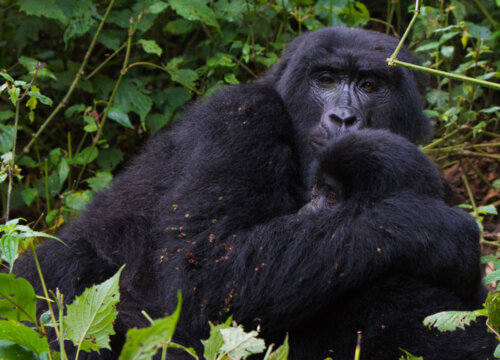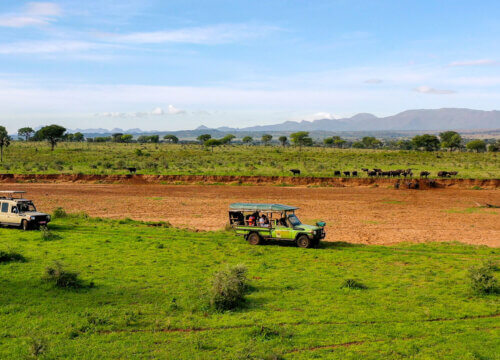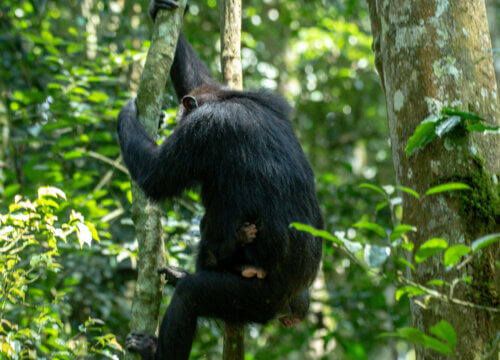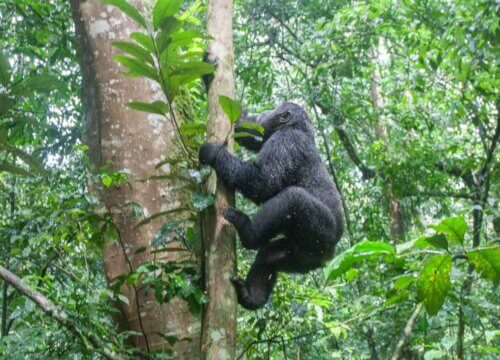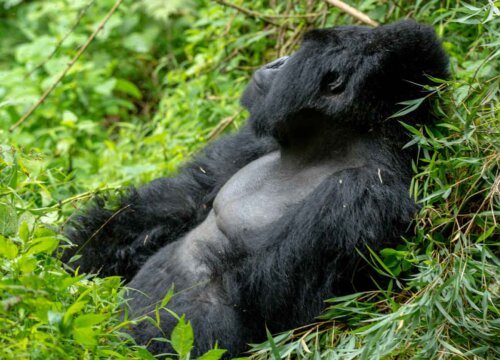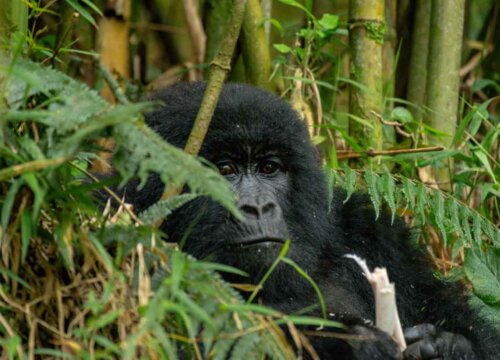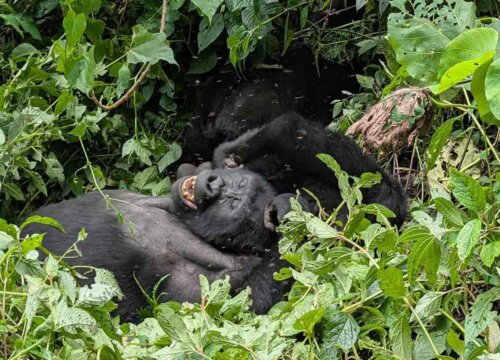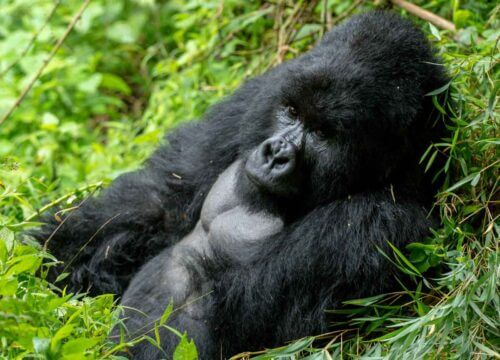How many hours do you stay with Chimpanzees in Kibale Forest National Park?
How many hours do you stay with Chimpanzees in Kibale Forest National Park?
In case you are planning to do Chimpanzee trekking in kibale Forest National Park and you’re excited to hang out with our closest primate relatives, the chimpanzees, you’re in for a treat! The guided chimpanzee trekking experience in Kibale Forest National park typically lasts for about 1 hour. This gives you enough time to observe these interesting creatures in their natural environment, study their behavior and catch them swinging from tree to tree.
It’s advisable that you respect their space and follow the park’s guidelines for an adventurous and responsible wildlife encounter.
Chimpanzee trekking is better done in the morning when chimpanzees are moving down from tree nests at around 7:00am.
Kibale Forest National Park also provides Chimpanzee habituation which is an exceptional activity because tourists get intimate with the Chimpanzees for less dollars though the number of participants is regulated since their environments are more sensitive.
Kibale Forest National Park is located in the western Uganda. Spanning 795 square kilometers, the park is popular for its significant wildlife population of chimpanzees which is over 1,500. Beyond chimpanzees, Kibale hosts varieties of primates like the L’Hoest’s monkey, red colobus, black colobus, white colobus, blue colobus monkey and mangabey. Additionally, the park has mammal species for example the duikers, forest elephants and bushpigs. The park also has a bird setting of more than 375 species like the great blue turaco, yellow bellied turaco, African Pygmy Kingfisher, Grey headed Kingfisher, Green Headed Sunbird, Yellow backed weaver and others.
The charming rainforest is known for its majestic trees, vivid plant species, and incredible diversity of flora. Guided nature walks in Kibale allow tourists to explore and gain understanding about several plants thriving in the park which makes it a prime safari destination for ornithological research and bird watching.
Information about the Chimpanzees
Chimpanzees are primarily found in the forests of Uganda mainly in national parks such as Kibale National Park, Budongo Forest Reserve, and Queen Elizabeth National Park. These protected areas provide important habitat for chimpanzees and play a crucial role in their conservation.
Chimpanzees are one of the most intelligent species on earth. These remarkable creatures share 98.8% of their DNA with humans, making them our closest living relatives. These genetic similarities reflect our evolutionary history over the years.
Chimpanzees are 4 feet tall and weigh 80kg.The female chimpanzees are shorter and weigh usually 30kg.They are highly social animals that live in families ranging from 20 to over 200 members. Within these communities, they form strong bonds and exhibit complex social behaviors. They communicate amongst themselves using a variety of vocalizations, facial expressions, and gestures which makes it easy for them to mock back at you in case you do. They also use tools like sticks and stones for gathering food and hunting.
Chimpanzee societies are headed by an alpha male, who is the largest and most dominant individual in the group. However, females also play an important role in the social structure, creating strong alliances and maintaining the unity of the group.
Chimpanzees are currently listed among the endangered species by the International Union for Conservation of Nature. Main threats to their survival are habitat loss, poaching and diseases. Deforestation and human encroachment have led to a significant decline in their natural habitat, putting these creatures at risk of extinction.
Chimpanzee touring Experience
Chimpanzee trekking is among the most fascinating safari activities best done in Kibale Forest National Park since it has the largest population of Chimpanzees in Uganda.
Your chimpanzee tour safari experience begins in the morning with a briefing from experienced guides who provide important information about the chimpanzees, the rules and regulations for trekking, and what to expect during your adventure. Once you are fully prepared, it’s time to go into the forest and search of these animals.
Two guides lead as one goes inside to see the alpha male of one family then signal to others to start in the trail to track that specific family. Walking through Uganda’s dense forests can be a challenging but worth it. As you cross the rough forest, keep your eyes and ears open for signs of chimpanzee activity. Chimpanzee trekking takes 30 minutes to 3 hours. After spotting Chimpanzees, you are given an hour to be in their presence. You can use this chance to take their pictures but with no flashlight and also record their memories.
Watching these intelligent creatures interact with one another, look for food, and take care for their young ones is a humbling experience that will stay with you long after the tour.
Interesting facts about chimpanzees.
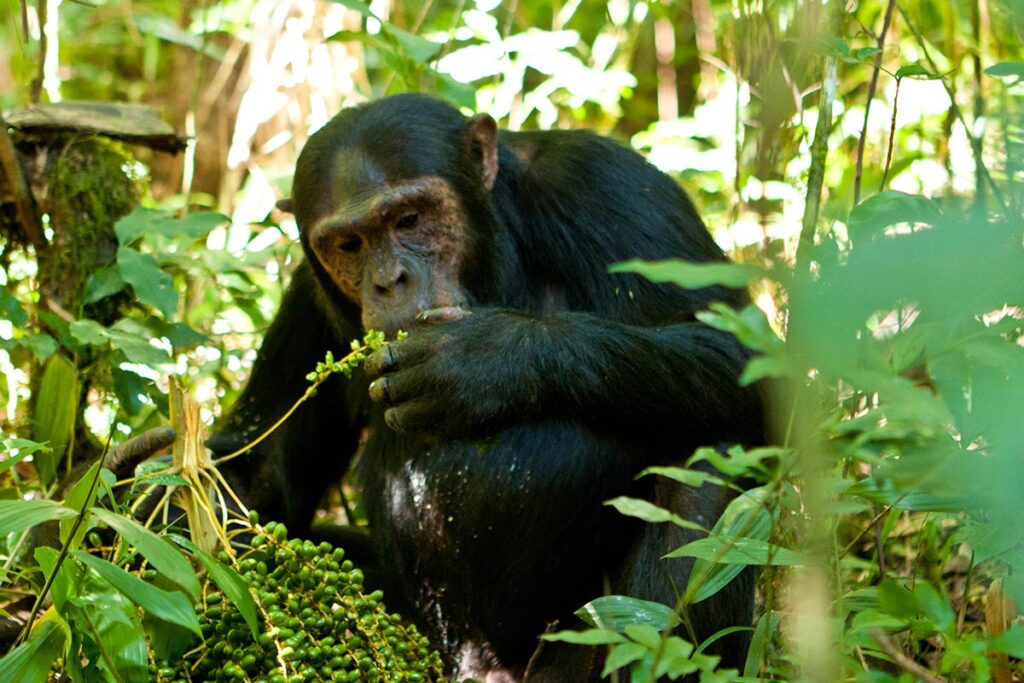
Chimpanzee trekking in kibale Forest National Park
Genetic similarity. Chimpanzees are fascinating creatures that share approximately 98.8% of their DNA with humans and studying them can provide valuable insights into our own evolutionary history.
Social Structure. Chimpanzees live in large social groups known as communities. These communities have over 20 to 200 individuals, and they are led by a dominant alpha male. In these communities, chimpanzees create strong bonds with one another and engage in various social behaviors such as grooming, playing, and even engaging in conflict resolution.
Problem solvers. Chimpanzees are known for their ability to use tools. They have been observed using sticks to extract insects from nests, using rocks to crack open nuts, and even using leaves as makeshift umbrellas when it’s raining. This shows their problem-solving skills and ability to adapt to their environment.
Communication. Chimpanzees communicate using vocals, facial expressions, and body language. They use different calls to send specific messages for example warning others about the presence of predators or signaling the discovery of food. They also use gestures and postures to express their emotions and what they intend to do.
Intelligence. Chimpanzees are highly intelligent animals with advanced cognitive abilities like learning from observation and understanding numbers. In captivity, they have been taught to use sign language and symbols to communicate with humans.
Hunting Behavior. While chimpanzees are primarily herbivorous, they have been seen hunting and eating meat. Hunting is done by male chimpanzees and it often involves cooperation among group members.
Self-medication. Chimpanzees use plants and leaves to treat themselves and their wounded or sick fellows.
Cultural Diversity. Different chimpanzee populations exhibit cultural variations in behaviors such as tool use, grooming practices, and communication. These cultural differences are passed down through generations and contribute to the overall diversity within the species.
Sharp memory. Chimpanzees have abilities to recall what happened long ago and also lean from past experiences to better themselves.
What to bring during chimpanzee Trekking
When preparing for a chimpanzee trekking adventure, it’s important to pack the right essentials to ensure a comfortable and enjoyable experience.
Hiking boots. These support and give balance in rough paths.
Lightweight clothes. Breathable and quick-drying clothing keep you comfortable during the journey.
Walking stick. It helps you balance challenging paths.
Rain jacket. It shields you during unpredictable weather like rains.
Long pants and long-sleeved shirts. They Protect you from forest scratches, insect bites, and the scotching sun.
Hat and sunglasses. These shield you from the sun and strong wind.
Water bottle. Stay hydrated throughout the journey by bringing a reusable water bottle.
Insect repellent. Repellent protects you from mosquitoes and other insects that may infect you with malaria.
Camera. Capture unforgettable moments during the trek with a camera or smartphone.
Binoculars. They enhance your wildlife viewing experience by helping you see chimpanzees in the trees from a distance.
Sunscreen. Apply sunscreen to protect your skin from sun burns.
Hand sanitizer. Keep your hands clean before eating or after using the bathrooms.
Snacks. Pack simple energy-boosting snacks like nuts, granola and dried fruit for quick energy during the trek.
Permit and identification. Remember to bring your chimpanzee trekking permit and a form of identification for verification purposes.
Cash. Carry some local currency for any extra expenses or tips for guides.
How much do Chimpanzee trekking permits cost in Kibale Forest National Park?
To participate in this unforgettable tour, visitors are required to get chimpanzee trekking permits issued by Uganda Wildlife Authority. These permits are important for ensuring the conservation of the chimpanzees and their environment, community development and reducing the number of visitors to keep Chimpanzees comfortable.
The cost of a chimpanzee trekking permit in Kibale Forest National Park is 250 USD per person for foreign non-residents,200 USD for foreign residents, and UGX 200,000 for East African citizens. It’s important to note that these prices are subject to change.
How one can book Chimpanzee trekking permits in Kibale Forest National Park
You can book the Chimpanzee trekking permits through us by contacting our tour consultants. We check if your permit is available on your preferred date from Uganda Wildlife Authority. In case permits are available on your dates, you are asked to make a deposit on the permit and once payment is made, we are able to buy the permit on your behalf and send you a scanned copy for approval.
We additionally help you find meals, accommodation and transport.
Chimpanzee trekking permits in Kibale Forest National Park can also be got through Uganda Wildlife Authority through their email
When to book Chimpanzee permits in Kibale Forest National Park
If you are planning to experience the thrill of chimpanzee trekking in Kibale Forest National Park, it is important to book your permit like 3 to 6 months in advance to secure your spot and avoid disappointments. The demand for chimpanzee trekking permits in Kibale Forest is high during the peak tourist months of June to September and December to February.
Be sure about your travel before booking because once permits are booked there are no refunds.
Contents of a Chimpanzee trekking permit in Kibale Forest National Park
A Chimpanzee trekking permit in Kibale Forest National Park has a guided tour,1 hour for chimpanzee viewing, entry to the park, park ranger escort, pre-trekking briefing and more that give you an adventurous experience.
Best season for Chimpanzee trekking in kibale Forest National Park
Chimpanzee trekking safari in Kibale Forest National Park can be done during any season of your choice that is either rainy season of March to May and November or dry season that is from June, July, August, September, December, January and February.
Chimpanzee trekking during the dry season in Kibale Forest National Park
Are you planning a trip to Kibale Forest National Park for chimpanzee trekking? If so, you’ll want the best season to give you a memorable experience. The best time for chimpanzee trekking in Kibale Forest National Park is during the drier months of the year which are from January to February and from June to September. During these months, the paths are drier making it easy to reach and see these incredible animals in their natural environment.
Chimpanzee trekking in the wet or rainy season
Chimpanzee trekking in the wet or rainy season can be a unique and rewarding experience for adventurers that is reduced prices for accommodation and peaceful movements due to fewer tourists. The lush greenery and abundance of fruits during this time make it easier to spot these animals. The weather comes with some challenges for example muddy trails and unpredictable rainfall. This makes roads slippery and hard to reach. Sometimes trekking is postponed or cancelled for other days. The wet season is during March, April, May, October and November.
Preparing for this season prevents you from uncertainties thereby making your experience in Kibale Forest National Park enjoyable.
Explorer More Safaris
- 3 Day Bwindi Gorilla Trekking Safari
- 4 Day Uganda Gorilla Trekking and Wildlife Safari
- 4 Days Gorilla Trekking and Adventure Safari
- 5 Days Uganda Gorillas and Chimpanzee Tracking Safari
- 4-Day Rwanda Gorilla Trekking and Golden Monkey Tracking Safari
- 5 Day Gorilla Habituation and Chimp Trekking
- 6 Days Gorillas and Chimpanzee Trekking Safari
- 4-Day Uganda & Rwanda Gorilla Trekking Tour
- 3 Days Bwindi Gorilla Trekking Ugnada from Rwanda
- 10 days best of uganda primates & wildlife safari
- 10 Days Uganda Primates and Game Safari

